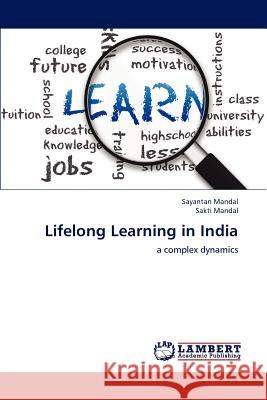Lifelong Learning in India » książka
Lifelong Learning in India
ISBN-13: 9783659148781 / Angielski / Miękka / 2012 / 308 str.
Lifelong learning is a much-used and dynamic term in recent global and national policy arenas. It has gained a multidimensional nature within and beyond the education policy domain. In India, the perception is changing too, which is different from its traditional understandings of lifelong learning. This modern conceptualization is highly interlinked with the concepts of knowledge economy, knowledge society and globalization. The nature of national level policy formulation has also undergone a sea change and huge efforts are being made to make it nationally realistic yet globally viable. This book, therefore, attempts to analyze these changing dimensions and explores the present changing perspectives of lifelong learning in India in the context of globalization. It tries to analyze, how the present socio-economic and political situations play complex roles in determining the perspectives of lifelong learning in India. It also discusses why and how policies and programs respond to this complex issue. It is the hope that this book will be able to contribute to the understanding of the changing dimensions of lifelong learning in India by linking it with the concerned global changes.
Lifelong learning is a much-used and dynamic term in recent global and national policy arenas. It has gained a multidimensional nature within and beyond the education policy domain. In India, the perception is changing too, which is different from its traditional understandings of lifelong learning. This modern conceptualization is highly interlinked with the concepts of knowledge economy, knowledge society and globalization. The nature of national level policy formulation has also undergone a sea change and huge efforts are being made to make it nationally realistic yet globally viable. This book, therefore, attempts to analyze these changing dimensions and explores the present changing perspectives of lifelong learning in India in the context of globalization. It tries to analyze, how the present socio-economic and political situations play complex roles in determining the perspectives of lifelong learning in India. It also discusses why and how policies and programs respond to this complex issue. It is the hope that this book will be able to contribute to the understanding of the changing dimensions of lifelong learning in India by linking it with the concerned global changes.











